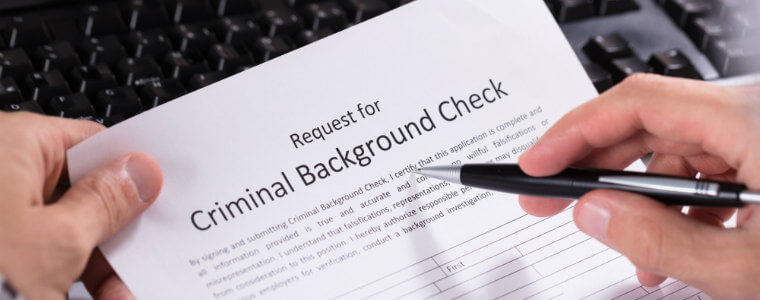The implications of a criminal record can persist long after one’s legal troubles are over — affecting employment, housing, and other aspects of life. In this blog, we delve into the intricate world of criminal records, exploring their lifespans and the possibilities for clearing one’s record.
What Is a Criminal Record?
A criminal record is a comprehensive historical document maintained by state or federal governments detailing your criminal law violations, arrests, and convictions in chronological order.
At the federal level, the FBI’s National Crime Information Center (NCIC) oversees a nationwide criminal record database, including federal crimes and voluntarily submitted state data. These records are routinely reviewed by credit reporting agencies for credit applications, employers for background checks, and landlords for tenant assessments and are accessible to law enforcement agencies and courts.
How Long Does a Criminal Record Last?
Criminal information remains on criminal records indefinitely, accessible to anyone with authorization. Some states offer a process called “expungement,” which may involve sealing or completely erasing records, removing them from the state database, and destroying any physical copies. It’s important to note that there is no federal equivalent to record expungement. For federal records, the sole recourse for individuals seeking relief is to obtain a presidential pardon.
In Texas, an individual who has successfully completed deferred adjudication community supervision can petition the court that placed the individual on probation for an order of nondisclosure of the related criminal records under Texas Government Code §411.071.
An order of nondisclosure prohibits criminal justice agencies from disclosing to the public criminal history record information related to an offense. Nondisclosure is different from expungement in the sense that the record does not “go away.” It is merely held back from access by the public.
How Long Do Arrests Stay on Your Record?
Arrests are retained on your criminal record until expunged. Alternatively, you can, under specific circumstances, request an order of nondisclosure. This doesn’t erase the arrest from your record entirely, as law enforcement agencies can still access it. However, it does restrict public access, such as for prospective employers. An attorney can guide you through the nondisclosure process.
How Long Does a Conviction Stay on Your Criminal Record?
Convictions persist on your criminal record until expunged. Alternatively, you can, under certain conditions, petition for an order of nondisclosure. Similar to arrests, nondisclosure doesn’t completely erase the conviction from your record; law enforcement agencies can still access it. But it does protect against public disclosure to prospective employers or landlords. An attorney can help you with the nondisclosure process.
How Long Does a Minor Criminal Record Last?
In Texas, juvenile criminal records are not automatically confidential and don’t become sealed when you reach 18. Unsealed records remain accessible to various parties, including law enforcement agencies, probation officers, juvenile justice officers, potential employers, and educational institutions.
However, Texas law provides the option to seal some convictions after a waiting period according to Family Code §58.253. A new “automatic sealing” process removes the need for applications or petitions and requires the juvenile court to order sealing based on specific criteria. Additionally, another law allows the expungement of certain minor criminal records, like minor alcohol violations handled in municipal or justice courts.
How Long Does a Misdemeanor Stay on Your Record?
A misdemeanor, although less serious than a felony, is still a criminal offense and remains on your record indefinitely unless expunged. Unlike some misdemeanor offenses, there’s no predefined expiration date for their presence on your record. While legally, misdemeanors persist for life, some background checks have limitations, such as the “seven-year rule” in Texas, which is further elaborated below.
Specific Charges
If you were arrested for a misdemeanor or felony, your criminal record may qualify for expungement under the following conditions:
- You were acquitted of the crime for which you were charged.
- You were convicted but subsequently found to be innocent.
- You were convicted but subsequently pardoned by the governor or president.
- You were formally charged by indictment or information, the case against you was later dismissed, and the statute of limitations has expired.
- You were arrested but not formally charged, and you satisfy a proscribed waiting period.
Expunction Waiting Periods in Texas
If you were arrested but not charged with a crime in Texas, specific waiting periods must pass before you can apply for an expunction. These waiting periods serve to allow the prosecution sufficient time to build a case if they decide to do so. Here are the waiting periods:
- 180 days from the date of arrest for a Class C Misdemeanor.
- One year from the date of arrest for a Class A or Class B Misdemeanor.
- Three years from the date of arrest for a felony.
Additionally, record sealing in Texas is available to those who have successfully completed all terms and conditions of deferred adjudication probation. For a misdemeanor in Texas, you can seal your record immediately after completing your deferred adjudication. For a felony, you must wait five years to seal your record.
Some charges are never eligible for a nondisclosure, such as:
- Abandoning or Endangering a Child
- Aggravated and Regular Sexual Assault
- Aggravated Kidnapping
- Attempt, conspiracy, or solicitation to commit any of the above-listed offenses
- Burglary of Habitation with intent to commit the above-listed offenses
- Capital Murder or Murder
- Child Pornography charges
- Compelling Prostitution
- Family Violence
- Indecency with a Child
- Injury to a Child, Elderly, or Disabled person
- Prohibited Sexual Conduct
- Sexual Performance of a Child
- Stalking
- Unlawful Restraint, Kidnapping, or Aggravated Kidnapping of a person younger than 17 years old
- Violation of a Protective Order
How Long Does a DWI Stay on Your Record?
A DWI, despite its association with driving, is a criminal violation, and it remains on your record for life unless subject to expungement or nondisclosure, as discussed in this article.
How Long Does a Bad Check Stay on Your Record?
If convicted of passing a bad check in Texas, this offense remains on your record for life unless it’s eligible for expungement or nondisclosure.
How Far Back to Background Checks Go?
Background check rules vary by state, and in Texas, the standard practice allows employers to examine a candidate’s criminal history for the past seven years. However, there are exceptions to this rule.
If the job pays more than $75,000 annually, the employer can look back to your eighteenth birthday. Jobs within insurance agencies also extend their search to your eighteenth birthday. Occupations involving residential delivery or in-home services — such as landscapers, electricians, or delivery drivers — require background checks covering 20 years for felonies and 10 years for misdemeanors.
How Do Misdemeanors Come Up on Criminal Background Checks?
A misdemeanor, while defined as a minor wrongdoing or crime, is still considered a crime. As such, it is still a part of your criminal record, just like a felony conviction would be. It stays on your record indefinitely unless you seek an expungement. The misdemeanor is found as part of the criminal background check. It is noted as a misdemeanor rather than a felony on the check.
How Long Does a Felony Stay on a Background Check?
Felonies and misdemeanors both are part of a criminal record and stay on the record until the record is expunged. They stay on a criminal record indefinitely unless expunged, and they can be found through a background check subject to the statutory limitations on how far back a checker can look.
Get Legal Help from the Law Offices of Seth Kretzer
Your criminal record could be impeding your work life and living situation. Take back control of your life by working with an experienced federal appeals attorney in Houston who may be able to help your situation.
Contact The Law Offices of Seth Kretzer today to schedule a consultation.





